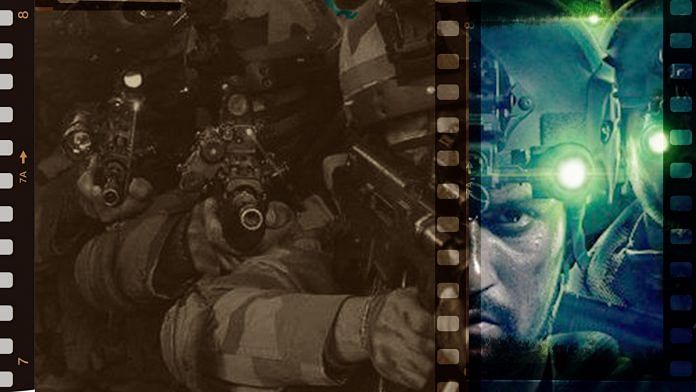After the Pulwama terror attacks, many Indians are clamouring for ‘revenge’ and ‘war’ against Pakistan. Recent Bollywood films like Uri: The Surgical Strike, Manikarnika and Padmaavat have glamorised the battlefield.
ThePrint asks: Have a slew of recent Bollywood films changed the way Indians view war?
In older war films like Border, Pakistan the country was the enemy. Now, it’s Islamic Pakistan
 Kaveree Bamzai
Kaveree Bamzai
Senior Journalist
War movies in Bollywood have changed in three significant ways. In Uri: The Surgical Strike, war seemed less bloody and more tactical. This is, of course, reflective of reality, but it also makes it seem easier to undertake operations— which for a nation like India in the grip of post-Pulwama passion is dangerous. War is not merely about targeting terrorist camps with drones and satellites, but about the loss of lives and permanent damage to society.
The second thing I find interesting, but also deplorable, is the heightening of communal differences. In movies such as Border, the enemy was Pakistan, a country, not a community. In movies now, the enemy is obviously an Islamic Pakistan, and when it is not contemporary, simply the Muslim. From Padmaavat‘s muscular, hyper-masculine Alauddin Khilji who is contrasted with the peaceable, romantic Ratan Singh, to Akshay Kumar’s forthcoming Kesari, which positions him at the head of 21 Sikhs taking on an army of Afghans, it is a manifestation of the current dispensation’s fear of small numbers: the battle is civilisational and the antagonist is the Muslim.
The last point I’d like to make is the utter disinterest the Indian moviegoer seems to have with China as the adversary. From J.P. Dutta’s Paltan, which focused on Nathu La, to Tubelight, which was shot against the backdrop of the 1962 war, China seems to have no place in the popular imagination.
Also read: Kangana Ranaut & Anupam Kher target liberals, but their patriotic act falls flat
Indian soldiers I interact with joke about the kind of war films Bollywood makes
 Snehesh Philip
Snehesh Philip
Senior associate editor, ThePrint
There is no doubt that Bollywood films depicting war are better made now than they were earlier. However, it does not change the way Indians see war.
For example Uri: The Surgical Strike is the closest to what you will get to watch on the big screen on how and why the 2016 surgical strike happened.
However, the makers of Uri have taken liberties to make it more Bollywood-esque and thus leaving you with the desire to see an Indian film that really brings on screen the realities and emotions of war, much like Saving Private Ryan or Platoon.
Indian movies have failed to depict war in its true sense. Our movies have always been about glory, romance and unimaginable bravery. The only decent war movie that Bollywood has made was Lakshya. Of course, I am willing to ignore the unnecessary romance that was brought into the movie.
War is not about glory alone. War is about the gore, sadness, despair and fear too. Most soldiers I interact with joke about the movies made so far. Even they are left with a desire to see a film that brings out the true emotions of war.
Also read: Kangana Ranaut’s Manikarnika is your guide to becoming a good Bharatiya
Bollywood hasn’t changed the way it views war, but the audience has definitely changed
 Deeksha Bhardwaj
Deeksha Bhardwaj
Reporter, ThePrint
In 1973, Raaj Kumar’s character from the Chetan Anand-directed Hindustan Ki Kasam (that focuses on the role of the Indian Air Force in the 1971 war) vows vengeance – “Jawaab dene aaunga, iss jawan ki kasam, Hindustan ki kasam.”
In 2019, Aditya Dhar-directed Uri: The Surgical Strike echoes a slightly altered version of the same sentiment through Paresh Rawal’s character – “Yeh naya Hindustan hai, yeh ghar mein ghusega bhi, aur marega bhi.”
Bollywood’s take on war, from the iconic scene in Border when Sunny Doel takes to the battlefield with a garland of grenades and a bazooka to take on the Pakistani army to Shahid Kapoor’s donning his armour to fight Muslim invader Alaudin Khilji in Padmaavat, has often been one of mindless glorification. A brew of righteous cause and (hyper) nationalism, and war is the justifiable end.
Over the years, the realism, the plot, the direction, and sometimes the acting, has definitely improved, but the depiction remains the same. If it’s the Indian military we talk about (Rangoon, Uri), it gets easier, since offering a dissenting perspective would be ‘anti-national’.
When it comes to epic battles (Padmaavat, Manikarnika), the ruler is indisputably Hindu, thus, justified, irrespective of historical accuracy.
Bollywood hasn’t changed the way it views war, but its audience has changed. What Bollywood needs is an Apocalypse Now moment, it needs to take a step back and evaluate deeper questions like the futility of war and the human cost of it. The only time it seems to have come close was with Raazi, when Alia Bhatt’s character contemplates if all her sacrifices in the name of nationalism were meaningless.
Bollywood is changing and showing the human side of war to audiences now
 Samyak Pandey
Samyak Pandey
Intern, ThePrint
Bollywood is changing along with the taste of Indian audiences. Films in the1990s were soaked in the syrup of patriotism leaving little or no room for the edge-of-the-seat thrillers like Baby. Movies like Haqeeqat, Hindustan Ki Kasam and Border are proof of this.
However, things changed at the turn of the century. People were full of hope and wanted to take things head-on. The movies like Lakshya andTango Charlie ventured into the into uglier side of war. They tried to show the human side of war and personal stories. The dilemma of a soldier during war and stories about human rights violation by the armed forces made its way into storytelling — something not talked about because the armed forces hold a sacrosanct place in society.
Similarly, recent movies such as Raazi, Parmanu, Uri, and Holiday show the struggle of field agents and the preparedness it takes to execute orders. Newer films are showing citizens a different perspective on war and battle, and what it takes to stomp boots on the ground.
Also read: Revenge is for morons. Can Modi switch to deterrence, less sexy but way more diabolical?
Bollywood’s current warpath is seasonal rush; it will pass before we have a view
 Prashant Dixit
Prashant Dixit
Senior copy editor, ThePrint
Indians tend to look at war through heroic tales about the bravery of the soldiers (and of the freedom fighters) that get passed on from one person to another, almost like a shared experience. The idea that war could be multi-faceted, and sometimes a completely political positioning, gets lost in the exultation of our armed forces and their victories. It can be said that an anti-war mindset is generally missing from our collective psyche.
Bollywood war films, in a way, mirror this hyperbolic mindset. They generally gloss over (if not completely ignore) the day-to-day challenges of the war zones, the political manoeuvrings leading up to a war. Our films rarely display any creative maturity to infuse the sense that wars are inherently destructive. Films with a nationalist zeal are even more tone-deaf in this regard.
And then from time to time, Bollywood rushes past us its Bhagat Singh-phase or this recent crop of battle-themed, political thrillers with some undertones of war. At no point does it seem to offer any nuanced view that would make us think.
There was one rare time, though. In 1997, Border gave Indians a voice they have clung on to ever since. Images from that film — of its ‘soldiers’ and their families, of the final call for peace overpowering the sense of victory — are what someone unknown to the real ones is likely to conjure; whereas “How’s the Josh?” is a slogan, part of a wave that will pass.
By Neera Majumdar, journalist by ThePrint.



